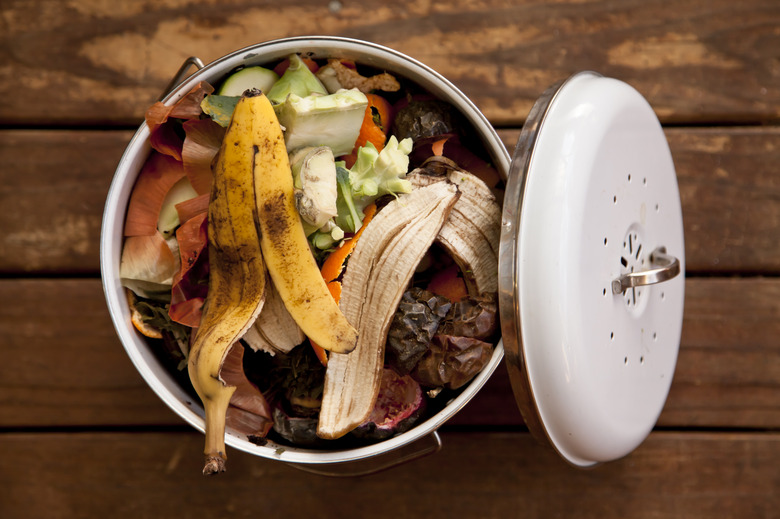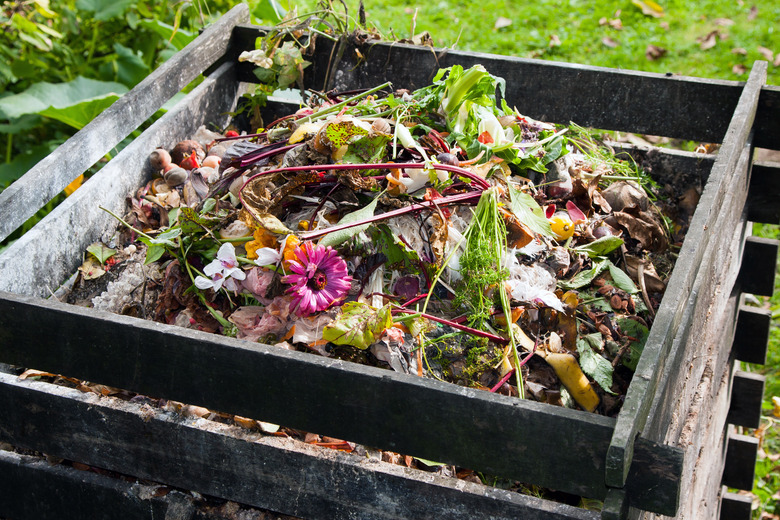Home Composting: Things You Can And Cannot Put In Your Compost
We may receive a commission on purchases made from links.
Composting is an eco-friendly way to break down organic matter so its nutrients can be introduced into your soil. This not only benefits your garden but helps keep useful organic waste out of your local landfill. While composting is a great way to turn yard and food waste into something useful, not everything from your home can be added to the compost bin, and in fact, some materials can actually harm the microorganisms that make composting possible in the first place, leaving you with a stinky trash pile rather than a healthy compost pile.
The Green and Brown Balance
The Green and Brown Balance
In order to successfully compost organic materials, you need to create an environment that is hospitable to the good microbes that break things down. The best way to do this is by cultivating a good balance of "brown" (carbon-rich) and "green" (nitrogen-rich) waste. Ideally, you want about three parts brown material to one part green.
Brown ingredients are usually brown when they come from yard waste and include materials such as fallen leaves, straw and sawdust, while green ingredients include things like kitchen scraps. Many organic materials are green when fresh but lose nitrogen as they age and become brown as they dry, such as grass clippings that are green when first cut but turn brown as time wears on. It's worth noting that not everything can be sorted by color. For instance, manure is brown but is considered a composting green since it is high in nitrogen.
Pay attention to whether your compost ingredients are green or brown before putting them in your compost bin in order to maintain a healthy ratio. If you notice that the compost starts to smell bad, mix in more dry browns. Also, remember to put larger materials, like sticks, at the bottom of the pile to help improve airflow.
Composting Grass Clippings
Composting Grass Clippings
Some of the best things you can add to a compost bin or pile are grass clippings since they so quickly turn from a nitrogen-rich green into a carbon-rich brown. Most herbicides and pesticides break down rather quickly, so you can compost grass that has not been recently sprayed. Do not add grass or other yard waste that has been chemically treated within the last few weeks, as these may harm the microbiome of your compost heap. Also, be sure to well mix the grass with other ingredients to prevent it from sticking together and compacting into a hard mat that won't let in oxygen and thus won't break down at all. Adding too many fresh grass clippings or failing to mix in clippings can lead to a very stinky compost pile.
Other Yard Waste
Other Yard Waste
When it comes to useful brown waste, sawdust, wood chips, sticks, twigs, leaves and pine needles are all very useful. Be sure to cut up larger branches or they will take way too long to break down. Do not add too many small sticks or branches or it will slow down the composting process. Mix in sawdust with other materials because like grass clippings, it can stick together and become too dense to properly compost.
Only use sawdust and wood chips that you know to be free from chemical treatments that could hurt your compost bin's microbiome. When adding a lot of materials from acidic trees, such as oaks and pines, consider adding some wood ash to the pile as well, as these are alkaline and can neutralize the acidity. Avoid using coal ash, which is too high in sulfur and iron for composting.
You can also throw in any annual garden plants or houseplants that have naturally died off at the end of the season but keep in mind that if they went to seed and are active self-seeders, you may end up growing more of these plants wherever you spread your compost. For this same reason, avoid putting weeds in your compost pile or you may end up growing more weeds. Also avoid putting any diseased or pest-infested plants into the bin since these problems could spread when you use the compost.
In theory, properly heated compost should reach high enough temperatures to kill off any seeds and most pathogens, but it is advisable to avoid any potential problems and simply keep weeds, diseased plants or pest-infested plants out of your compost bin.
Adding Kitchen Scraps to Compost
Adding Kitchen Scraps to Compost
Kitchen scraps are a great source of green ingredients in the compost pile, and it's always nice to divert these materials from the landfill, but not all foods are safe for your compost bin. Eggshells, nut shells and even coffee grounds are all compostable, but oil or products with a particularly high oil content, such as nut butters, salad dressings and mayonnaise, should be avoided. These are likely to attract pests, and they also upset the moisture balance in your compost.
Overall, fruit and vegetable scraps are great to compost as long as you remove the stickers, which will not break down. For larger materials or those that are harder to break down, such as watermelon rinds, citrus skins or avocado peelings, try chopping or shredding the materials into small pieces to speed up the composting process. Corn cobs should be left at their full size because their size and shape help them provide necessary aeration to the pile.
While breads, cereals, pastas, oats, rice, and other grains are generally OK to add into the compost bin, it's best to add the products after they have started to go stale since they will break down quicker and will better balance the moisture content of the pile.
Most animal-based products should be avoided. While eggshells are fine, eggs, meat, fish and dairy should be avoided. They can breed disease as they rot, they attract pests, they are particularly odorous and they can cause the temperature of your compost pile to rise too high and kill off beneficial microorganisms.
Other Types of Trash
Other Types of Trash
Many people who are new to composting are surprised to learn just how many things they can compost, but outside of food and yard waste, things start becoming more confusing. Keep in mind that metal, glass and plastic are not compostable and bioplastics will not break down in home compost piles. Paper, including newspaper, is OK because newspaper inks are now water- or soy-based, but avoid using shiny papers. Avoid using other glossy papers, such as food packaging containers, because they do not break down well and some are lined with a thin layer of plastic.
Paper coffee filters are compostable but refrain from including nonpaper coffee filters. If you compost tea bags, cut off the tops because they're either fastened with staples or possibly sealed with a plastic glue. Similarly, cardboard egg cartons are fine but avoid adding Styrofoam or plastic egg cartons. You can even compost popsicle sticks and toothpicks.
Don't be afraid to think outside the kitchen. Dryer lint works as a brown compost material but only if it is from natural-fiber laundry (synthetic fabrics create lint full of microplastics) and if you do not use dryer sheets. Cardboard tubes from toilet paper and paper towels and even used paper towels are also good browns for composting.
Composting Animal Waste
Composting Animal Waste
While manure is a great green addition to compost, remember that this only applies to vegetarian animals, such as cows, horses and chickens. Do not add dog or cat feces or cat litter to your compost, as it is likely to carry disease organisms and will make the odor of your compost pile unbearable.
References
- Sierra Magazine: Composting 101: Hooray for the Black, Brown, and Green
- Country Living: Plastic-Free Tea Bags: Which Brands Are and Which Aren't?
- Garden Myths: How to Compost: Browns & Greens
- Conserve Engergy Future: 31+ Things You Should Never Put in Your Compost Heap
- Planet Natural: What To Use
- Live Science: The Science Behind Composting


